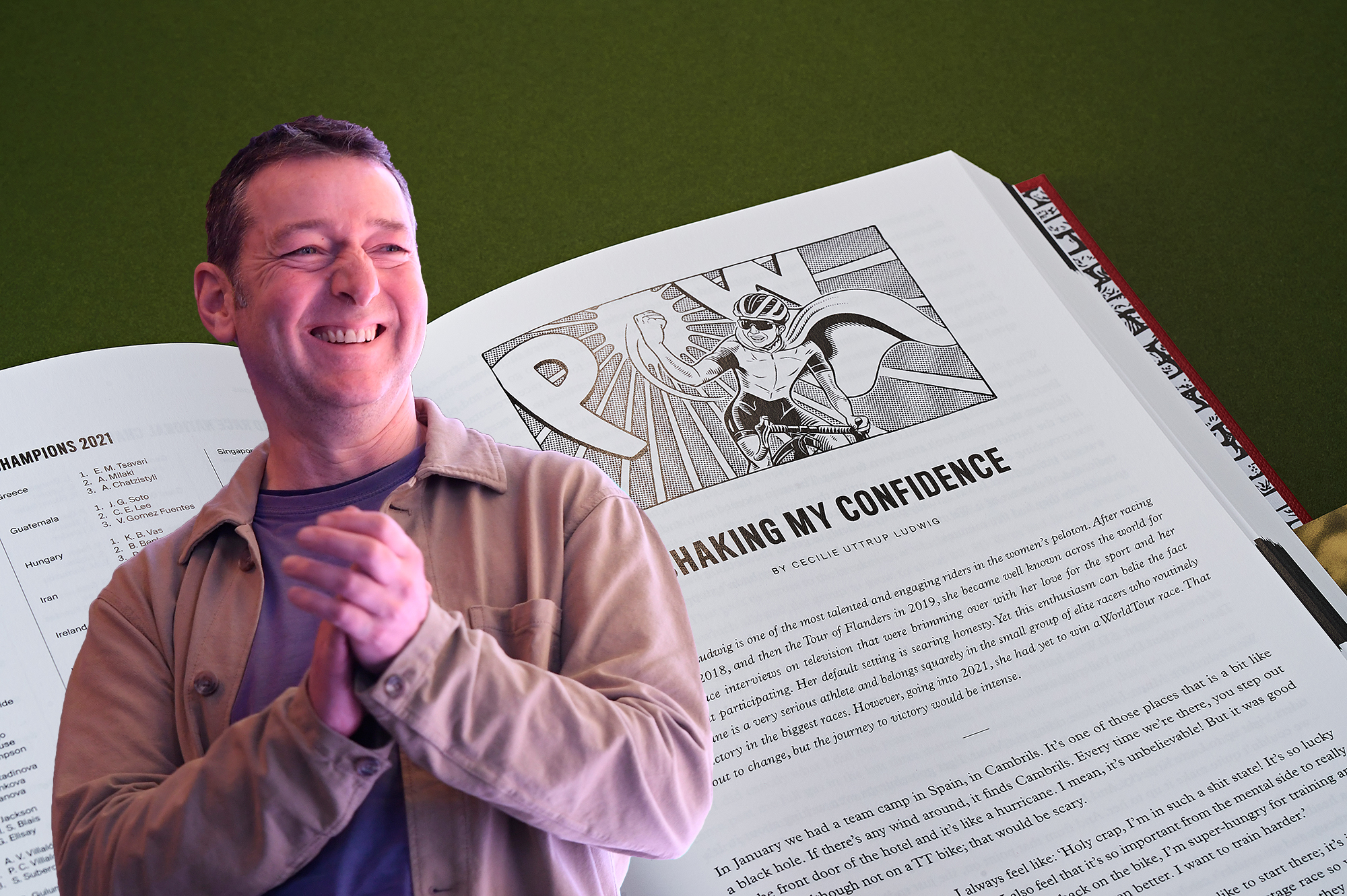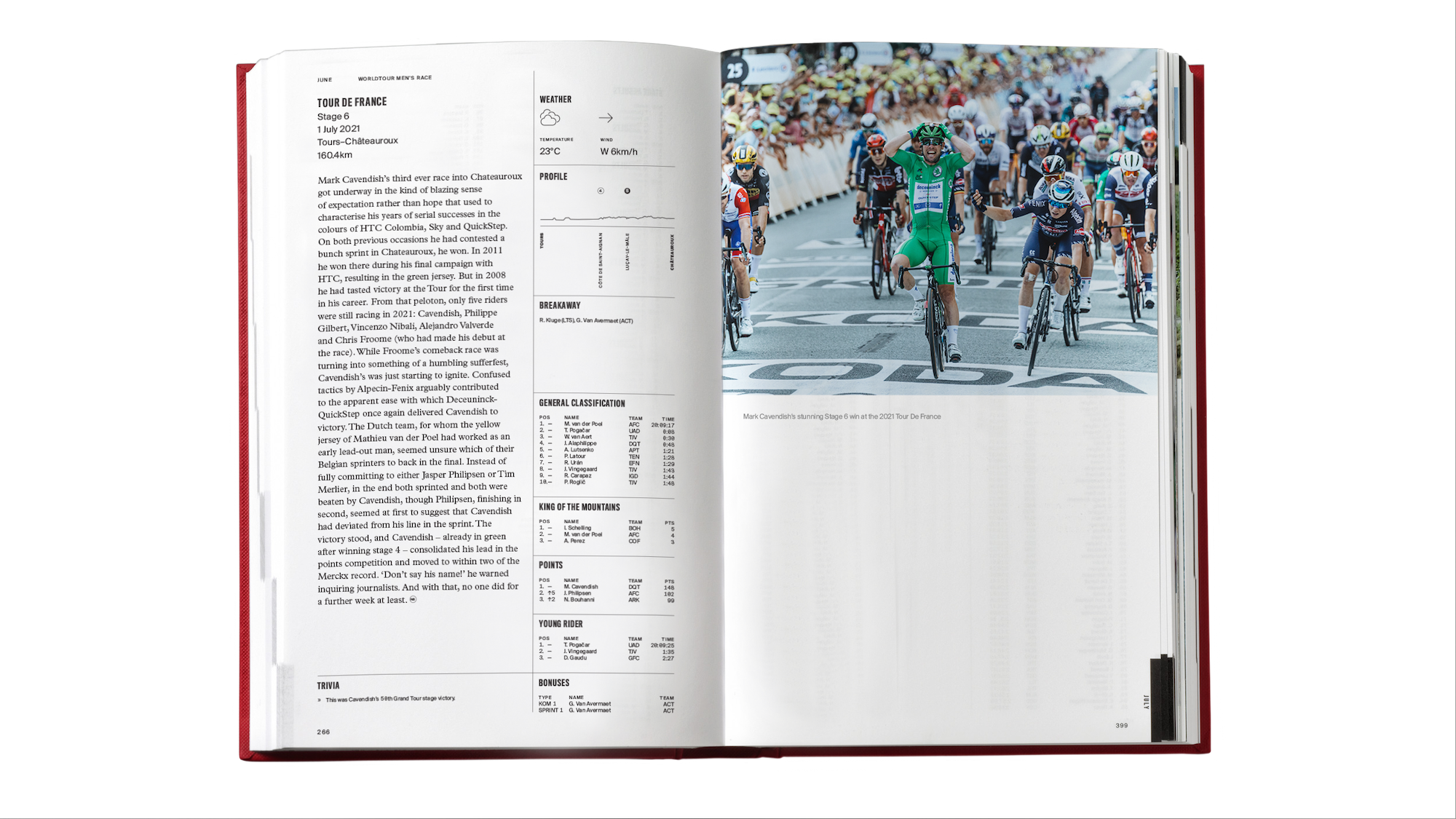Ned Boulting: 'Twitter eats into my day and sometimes into my soul a little bit'
With the 2021 edition released, the editor of the Road Book sits down for a Q&A session featuring Julian Alaphilippe, an imagined life as a footballer, and moths

Having spent your career interviewing people, is it weird when you get interviewed?
It's much harder than I ever imagined. As soon as I started being interviewed, which is some time ago now, I had a completely different appreciation for the pressure that you're put under when you have to answer a question like I'm doing now.
It's actually quite an instructive process for journalists to have to answer questions. It's much harder than you think it might be. And I'm always slightly in awe of riders who step off a bike at the end of a stage and have to articulate something that's not going to get them into trouble or misrepresent the race because it's quite easy to slip up when you're just ad-libbing. I've got a huge amount of admiration for people who have to answer these questions.
I guess media people are supposed to be completely unbiased at all times but whose your all-time favourite cyclist?
It's Alaphilippe at the moment. It's really interesting because The Road Book jury went off and thought about their choices this year [for the riders of the year awards] and I did notice a few people online vociferously objecting to the choices that the jury had come back with, which is fine. It's actually that's why you have awards, isn't it? So that you generate debate and you kind of enter a conversation as to why it might be that that rider's achievements are prioritised over other riders.
It was interesting that Alaphilippe's achievements, even though he kind of only won two races of real note, seemed, in the understanding of experts and ex-racers and people who really should have a very nuanced view of this, to eclipse Tadej Pogačar's achievements, or Primož Roglič's or Egan Bernal's.
Which is very interesting if you drill down into it because it's quite instructive about what it is that we admire in racers, what we really like seeing, and maybe that's the wrong word to use, because maybe Tadej Pogačar, and I'm just floating this out here, but maybe Pogačar, for example, or certainly Primož Roglič, is a rider who we can perhaps admire rather than necessarily love.
There's something about the way Alaphilippe pulls it off. He hasn't had the most prolific year but I think the way he does it, the way he wins, and how it's not just blind aggression, there's actually a lot of science behind it and a lot of thinking as well as racing instincts that goes into these victories.
If profit margins were no issue what’s the one thing you’d add or change about the Road Book?
Profit margins are a massive issue as they are for any start-up business but we're constantly looking to make small and affordable improvements to the book, we're adding content all the time. This year we included the Olympic Games, the Paralympic Games, and cyclocross for the first time. I suppose if I if I had one little wish it would be to add a little ribbon, which you get in old school encyclopaedias.
The latest race content, interviews, features, reviews and expert buying guides, direct to your inbox!
If you were given the power to delete the whole of Twitter, would you do it?
Absolutely, 100 per cent. It's a complete burden, most of the time. And I say that as someone who's fortunate enough to have a relatively benign Twitter universe. I don't get too much toxicity coming my way, by and large. But nonetheless, I find it an enormous pressure, and it eats into my day and sometimes eats into my soul a little bit.
I do think on balance it's a negative force rather than having a necessarily positive impact. And that's one of the joys about The Road Book. People often say 'why are you producing an analogue product in a digital age?' Well, I think it taps into precisely the same sentiments I've just expressed about Twitter. You can't wish the digital universe away because it's here to stay and it's part of the fabric of our everyday lives. But man, wouldn't it be nice to just take a time out? And I think that's why The Road Book works.

What are the best and worst things about cycling?
I suppose the best thing is that it's got a kind of chaotic and amateur heart that beats beneath the surface of what looks like quite a slick, global sport. And it's just, in almost every conceivable way, it's none of those things. It's making it up as it goes along in the best sense of the word. It's not just rapid change in the way that racing is conducted at the moment. And what riders are, it's also the very parameters of the sport. So you know, teams come and go, they collapse, they're completely unstable, and even when you get to a race and pin a number on, you have no idea what that race organiser might have in store for you that day because they can literally make it up as they go along. I think that's a tremendous strength and an enduring appeal.
What I don't like about it is that I think sometimes those of us...and maybe from time to time I'm guilty of this too, we have a tendency to have an inflated sense of our own self-importance in this sport, and an inflated sense of the scale and the size of the sport, because to us, it feels grand intuitively.
There was a very interesting graph that was circulated the other day about worldwide television broadcast deals, and what they're worth and a big pie chart that broke down what's what the value in broadcast terms of each sport was globally.
Of course, football dominated to a massive extent, I think it was over three-quarters of the pie was devoted to football. then after that came the big American sports and then there was a little slice of cricket and then there was a little grey 7 per cent that just said other sports. Cycling will sit somewhere in that little 7 per cent and it'll probably be a very small percentage of that 7 per cent. I think sometimes within the bubble we're quite guilty of overestimating our own self-importance.
You get to choose between being a professional footballer, darts player or cyclist, which do you choose?
I think I'd be a footballer. By saying that it's not about any greater devotion to watching football, I watch much more cycling and enjoy much more cycling than I do football. But I don't envy cyclists particularly. I don't wish I were them. I've never felt that. Not a bit of me wants to be Julian Alaphilippe, even Wout van Aert or a prodigious winner like Cavendish or Sagan.
It's still a miserable life, by and large, it's still a pretty awful way to earn a fortune. It's dangerous, it's boring and it's horrendously self-denying. I don't think any of those things sound like a very happy life.
Whereas, you can kind of dream about being part of an all-conquering football team on a bus when you're going to a match and you're pretty confident that you're going to win 5-0, and you'll probably get a hat trick.
That would be quite a good feeling, wouldn't it? To be Cristiano Ronaldo would be quite a good feeling from time to time. You actually enjoy your job. Whereas even the greatest riders don't really enjoy their jobs, even when they're winning. They enjoy the job being over but not much other than that, I don't think.
What’s the one thing right now that would improve the quality of your life?
I think it would be an entire new wardrobe. Because I haven't really bought any new clothes of any description for about five or six years and we've recently had an attack of moths. Gone through all my wool-based clothing, including my only suit.
If you see me in a grey suit at any event you can look at me in the knowledge that actually that suit has got tiny little moth holes in it. It's getting to the stage where it's actually becoming embarrassing, so I think I just need to throw all my clothes out and start again from scratch.
What's one thing that stands out, or you'll remember this year's Road Book, and by extension this cycling year, for?
I think it's really notable the fact that...let me just do a quick page count, the obituaries this year...because I think that's a really kind of, it's quite dark, but it's a real strength in the book - 47 pages of obituaries.
The story there is that Peter Cossins, who is probably the only guy around at the moment who can deliver these high quality obituaries as regularly as he does, he writes them beautifully and they're incredible. 75 per cent of these people who've died you won't have heard of them. But routinely all of them are fascinating and their contributions have been immense.
But this year, on two occasions, Peter got back to me throughout the year to, for want of a better word, renegotiate his fee because because there was so much writing that he had to do. So, and it's just a really sad truth, that a lot of these obituaries are people who were of advanced years, some of them in their eighties and nineties, and the incidence in which COVID-19 was mentioned on their death certificates was prolific.
So the book itself is slightly thinner than 2019, which was the last non Covid year by 80 or 100 pages but the obituaries section is almost twice as fat. And I think that in the years to come you'll look back on that and that will be a remarkable thing to be reminded of. A bit like when we look back 100 years ago at the Spanish Flu statistics and we kind of scratch our heads in disbelief. I think that it will be very telling in years to come.
The 2021 edition of The Road Book is available to purchase at www.theroadbook.co.uk
Jonny was Cycling Weekly's Weekend Editor until 2022.
I like writing offbeat features and eating too much bread when working out on the road at bike races.
Before joining Cycling Weekly I worked at The Tab and I've also written for Vice, Time Out, and worked freelance for The Telegraph (I know, but I needed the money at the time so let me live).
I also worked for ITV Cycling between 2011-2018 on their Tour de France and Vuelta a España coverage. Sometimes I'd be helping the producers make the programme and other times I'd be getting the lunches. Just in case you were wondering - Phil Liggett and Paul Sherwen had the same ham sandwich every day, it was great.